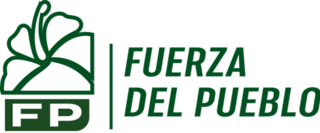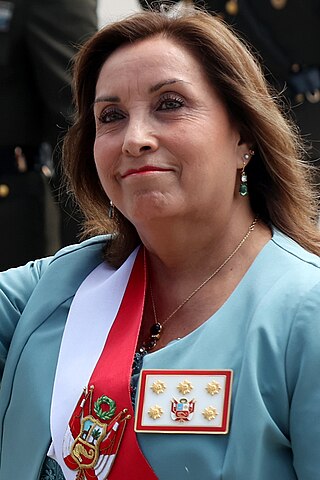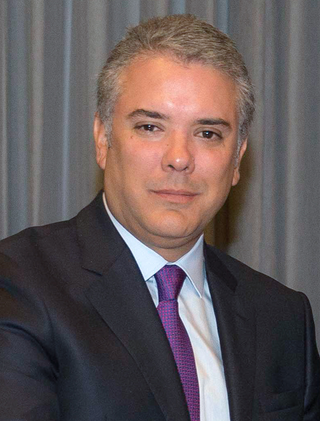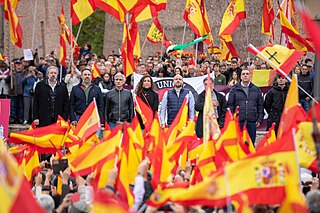Related Research Articles

Censorship in Venezuela refers to all actions which can be considered as suppression in speech in the country. Reporters Without Borders ranked Venezuela 159th out of 180 countries in its World Press Freedom Index 2023 and classified Venezuela's freedom of information in the "very difficult situation" level.

The 2014 Venezuelan protests began in February 2014 when hundreds of thousands of Venezuelans protested due to high levels of criminal violence, inflation, and chronic scarcity of basic goods because of policies created the Venezuelan government. The protests have lasted for several months and events are listed below according to the month they had happened.
Come Venezuela is a classical liberal political party in Venezuela headquartered in the city of Caracas. It has parliamentary representation in the National Assembly. Its registration as a political party has not been granted by the National Electoral Council.

2015 protests in Venezuela began in the first days of January primarily due to shortages in the country, with the first massive demonstration occurring on 23 January, on the anniversary of the 1958 coup d'etat against dictator Marcos Pérez Jiménez. The series of protests originally began in February 2014 when hundreds of thousands of Venezuelans protested due to high levels of criminal violence, inflation, and chronic scarcity of basic goods because of policies created the Venezuelan government. As of January 2015, over 50 people had been arrested for protesting. The protests are listed below according to the month they had happened.

The 2017 Venezuelan protests began in late January following the abandonment of Vatican-backed dialogue between the Bolivarian government and the opposition. The series of protests originally began in February 2014 when hundreds of thousands of Venezuelans protested due to high levels of criminal violence, inflation, and chronic scarcity of basic goods because of policies created by the Venezuelan government though the size of protests had decreased since 2014. Following the 2017 Venezuelan constitutional crisis, protests began to increase greatly throughout Venezuela.

The Mother of All Marches, also known as the Mother of All Protests, was a day of protests held on April 19, 2017, in Venezuela against the Chavista government of president Nicolás Maduro. The protests began after the Supreme Tribunal of Justice dissolved the National Assembly and took over its legislative powers March 29, 2017 in what was called a self-coup. The dissolution of the National Assembly was reversed shortly thereafter on April 1, 2017.

2018 protests in Venezuela began in the first days of January as a result of high levels of hunger by desperate Venezuelans. Within the first two weeks of the year, hundreds of protests and looting incidents occurred throughout the country. By late-February, protests against the Venezuelan presidential elections occurred after several opposition leaders were banned from participating. Into March, the Maduro government began to crack down on military dissent, arresting dozens of high-ranking officials including former SEBIN director Miguel Rodríguez Torres.

Presidential elections are scheduled to be held in Venezuela by 2024 to choose a president for a six-year term beginning on 10 January 2025. Leading opposition candidates have been disqualified from participating in the election during campaign or in previous elections. In June 2023, the leading candidate María Corina Machado was barred from participating by the Venezuelan government for alleged political crimes. This move has been regarded by the opposition as violation of political human rights and has been condemned by international bodies like the Organization of American States, the European Union, and Human Rights Watch, as well as countries such as Colombia, Paraguay, Uruguay, Ecuador, United States, United Kingdom, Germany, Chile, Canada, France and Mexico.

The People's Force is a political party in the Dominican Republic led by former President Leonel Fernández.

Luis Alberto Otárola Peñaranda is a Peruvian attorney and politician who currently serves as Prime Minister of Peru. He previously served as Minister of Defense twice, under Ollanta Humala and Dina Boluarte.

Dina Ercilia Boluarte Zegarra is a Peruvian politician, civil servant, and lawyer currently serving as the President of Peru since 7 December 2022. She had served as the first vice president and minister at the Ministry of Development and Social Inclusion under President Pedro Castillo. She served as an officer at the National Registry of Identification and Civil Status (RENIEC) from 2007 until 2022. With Boluarte assuming the presidency as the sole vice president, President of Congress Alejandro Soto Reyes is next in the line of succession.

Helimenes Leopoldo Castillo Atencio also known as The Citizen is a Venezuelan lawyer, talk show host and political commentator. Castillo is best known for hosting the television program Aló Ciudadano on Globovisión, which gave citizens the right to speak both to defend themselves and to reply to any news that was on the air and was born in response to the president's Aló Presidente program, Hugo Chávez.

Iván Duque's term as the 33rd president of Colombia began with his inauguration on August 7, 2018, and ended on August 7, 2022. Duque a right-wing leader from Bogotá, D.C., took office after a narrow victory over the incumbent left-wing leader of Human Colombia. Gustavo Petro in the 2018 presidential election. Duque was succeeded by leftist leader Gustavo Petro, who won the 2022 presidential election.

Following the ousting of president of Peru, Pedro Castillo on 7 December 2022, a series of political protests against the government of president Dina Boluarte and the Congress of Peru occurred. The demonstrations lack centralized leadership and originated primarily among grassroots movements and social organizations on the left to far-left, as well as indigenous communities, who feel politically disenfranchised. Castillo was removed from office and arrested after announcing the dissolution of Congress, the intervention of the state apparatus, and the establishment of an "emergency government", which was characterized as a self-coup attempt by some media organizations and institutions in Peru while Castillo's supporters said that Congress attempted to overthrow Castillo. Castillo's successor Dina Boluarte, along with Congress, were widely disapproved, with the two receiving the lowest approval ratings among public offices in the Americas. Among the main demands of the demonstrators are the dissolution of Congress, the resignation of Boluarte, new general elections, the release of Castillo, and the formation of a constituent assembly to draft a new constitution. It has also been reported that some of the protesters have declared an insurgency. Analysts, businesses, and voters said that immediate elections are necessary to prevent future unrest, although many establishment political parties have little public support.

The 2022–2023 Apurímac protests corresponds to a series of protests and violent confrontations that began on 10 December 2022 in the department of Apurímac in the context of the December 2022 Peruvian protests. The protesters demand the resignation of President Dina Boluarte, the closure of the Congress of the Republic, and new general elections. Unlike the protests in other regions and cities, in Apurímac the confrontations are more violent, and criminal acts have been recorded, such as the kidnapping of police officers and attacks on police stations. The Boluarte government declared a state of emergency, removing some constitutional protections from citizens, including the rights preventing troops from staying within private homes and buildings, freedom of movement, freedom of assembly and "personal freedom and security".

The Ayacucho massacre was a massacre perpetrated by the Peruvian Army on 15 December 2022 in Ayacucho, Peru during the 2022–2023 Peruvian protests, occurring one day after President Dina Boluarte granted the Peruvian Armed Forces expanded powers and the ability to respond to demonstrations. On that day, demonstrations took place in Ayacucho and the situation intensified when the military deployed helicopters to fire at protesters, who later tried to take over the city's airport, which was defended by the Peruvian Army and the National Police of Peru. Troops responded by firing live ammunition at protesters, resulting in ten dead and 61 injured. Among the injured, 90% had gunshot wounds, while those killed were shot in the head or torso. Nine of the ten killed had wounds consistent with the ammunition used in the IMI Galil service rifle used by the army.

On 9 January 2023, Peruvian National Police shot at protesters in Juliaca during the 2022–2023 Peruvian political protests against President Dina Boluarte, resulting in a massacre. At least 18 people, including a medic responding to the scene, were killed and over 100 others were injured by police responding to protests in the city, with all of the deaths being attributed to gunshot wounds. The massacre was the deadliest day during the series of protests in Peru. Local media criticized the response of national media, saying that events in Juliaca were overlooked. The Inter-American Commission on Human Rights would describe the event, along with the similar killings in Ayacucho, as a massacre.
This is a broad timeline of the ongoing 2022–2023 Peruvian protests against the government of Dina Boluarte and the Congress of Peru, sparked by the self-coup attempt of President Pedro Castillo, who was later arrested for his actions. The protests were organized by social organizations and indigenous peoples who felt they experienced political disenfranchisement, specifically on the politically left-wing to far left, with the groups demanding immediate general elections and a constituent assembly to draft a new Constitution of Peru.

The 2023 Spanish protests were a series of protests which began in October 2023, resulting from the announced negotiations of then-acting prime minister Pedro Sánchez's Spanish Socialist Workers' Party (PSOE) with former president of the Government of Catalonia Carles Puigdemont's Together for Catalonia (Junts) party. These negotiations were aimed at forming a governing coalition after the 2023 Spanish general election.
References
- ↑ "Castillo Rada Elsa - Dtto. Capital - Venezuela | Dateas.com". www.dateas.com (in Spanish). Retrieved 2023-03-20.
- 1 2 Méndez, Rosalie (2023-01-16). "Profesora Elsa Castillo al régimen: "El miedo se cambió de acera" (+VIDEO)". EVTV (in Spanish). Retrieved 2023-01-29.
- 1 2 Dona, Katherine (2023-01-15). "Día del Maestro: otro año sin nada que celebrar en el sector educativo". El Pitazo . Retrieved 2023-01-29.
- ↑ "Lo que sabemos: ¿quién inició el rumor de que Elsa Castillo viaja en jet privado?". Cazadores de Fake News (in Spanish). 2023-01-22. Retrieved 2023-01-28.